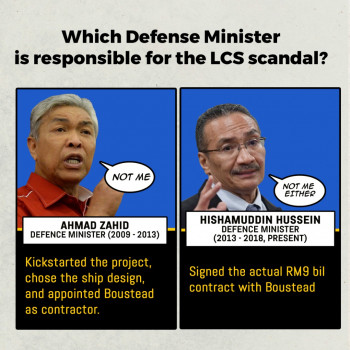by Hannah Yeoh
 On March 3rd 2012, PM Najib Razak visited Kedah, one of the states under Pakatan Rakyat rule, and in a speech at a meet-the-people programme, he apologized for the previous mistakes committed by Barisan Nasional. He said, “We must have made mistakes for the people to have rejected us. We apologise for our past mistakes.” The first thing I did when I read of this news report is to find out if the PM had listed out the ‘mistakes’ of Barisan Nasional. It’s important to find out what exactly is the PM apologizing for. But it became clear that he did not say what he was apologizing for.
On March 3rd 2012, PM Najib Razak visited Kedah, one of the states under Pakatan Rakyat rule, and in a speech at a meet-the-people programme, he apologized for the previous mistakes committed by Barisan Nasional. He said, “We must have made mistakes for the people to have rejected us. We apologise for our past mistakes.” The first thing I did when I read of this news report is to find out if the PM had listed out the ‘mistakes’ of Barisan Nasional. It’s important to find out what exactly is the PM apologizing for. But it became clear that he did not say what he was apologizing for.
It is obvious that when one apologizes, one is owning up to some mistake or sin and is accepting responsibility for it and/or its’ relating consequences. What is important in an apology is the confession of the specific wrongdoing.
In a sincere apology, first and foremost you need to acknowledge the specific wrongdoing. If you do not acknowledge and confess the wrongdoing, then how would the aggrieved party know what you’re referring to?
The Malaysian public is the aggrieved party here. And we have been so for many decades, half a century long. The wrongdoer is Barisan Nasional by the admission of the PM himself, and the PM is apologizing on its behalf.
When a serial thief says sorry, the judge would need to know which crime the thief is seeking forgiveness for. But if the thief simply says “for all my past mistakes”, how is the judge able to address this? Is the thief saying sorry for every single theft committed or is he saying sorry only for the ones which he is being charged for? Is the thief apologising for his criminal nature or is he apologizing for being caught?
The Malaysian public is stumped. We do not know what the PM is apologizing for. Where is the confession? It is public knowledge of the countless cases of corruption, injustice, oppression, racial discrimination, financial impropriety, abuse of power and desecration of government institutions by the BN government, past and present, but which ones are PM Najib apologizing for?
The judge facing that thief would demand for the thief to come clean if his apology is to be taken seriously. The same is expected now of PM Najib.
This total lack of confession indicates a total lack of repentance. If one does not repent before seeking for forgiveness, the act of apologising means absolutely nothing. In fact, saying sorry without really meaning it comes from a scheming heart, a heart that devises wicked plans.
If you are not confessing to anything but simply seeking an apology, you have an ulterior motive in doing so. You are not concerned with receiving forgiveness. You are more interested in the appearance of repentance.
It is this preoccupation of appearance that has characterised the administration of PM Najib and his 1Malaysia slogan. It is the appearance of seeking unity, the appearance of forging equality, the appearance of being repentant.
The people of Kedah was subjected to this at this point of time, to see and hear the PM say sorry, in order for the PM to project an appearance of repentance as part of a political strategy just before the General Elections to reclaim the votes which deserted BN in the last round.
Kedah was lost to Pakatan Rakyat for the first time in 2008. And on the very same day of the PM saying sorry, news reports began to surface that the latest UMNO survey indicates that if elections are called now, BN would lose more seats than in 2008.
Saying sorry becomes a political tool, and not for genuinely seeking forgiveness. Maybe this is what the PM meant when he rallied the BN machinery to “win at all costs” some time ago. Cheat in the elections, lure the voters with “you help me, I help you”, and if it’s still not working, just say sorry.
Through this latest political stunt pulled by the PM, Malaysians are once again left feeling patronised, this time with a false and insincere apology from no less than the Prime Minister himself.
We have to add this now to the laundry list of wrongdoings by Barisan Nasional: patronising the people. The people of Malaysia will not settle for an apology for we will not wait for BN’s repentance.
We have moved on for we do not want to harbour bitterness. We look forward to a new future for Malaysia with a new government that will uphold justice and righteousness for all. Justice for the repentant and the unrepentant. –The Rocket




Well, I think he should not even stop at stating specifically what he’s sorry for. He should also state what he’s going to do about it!